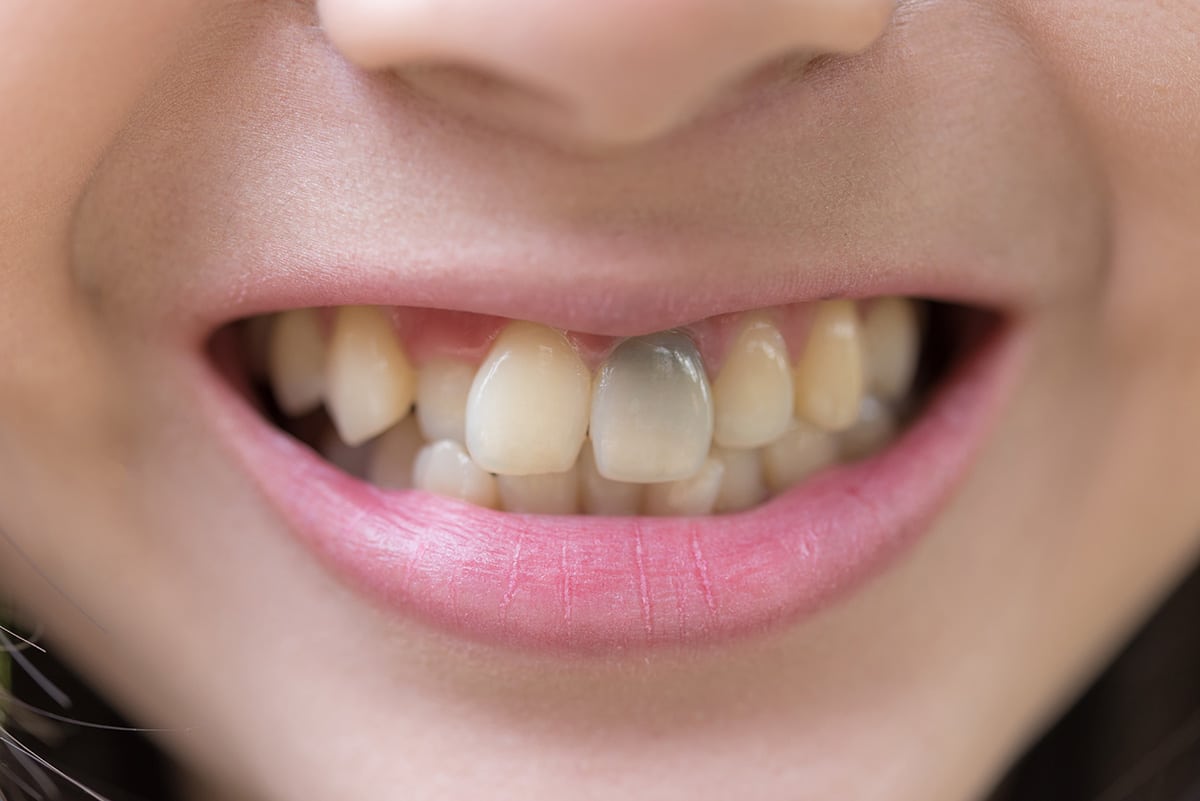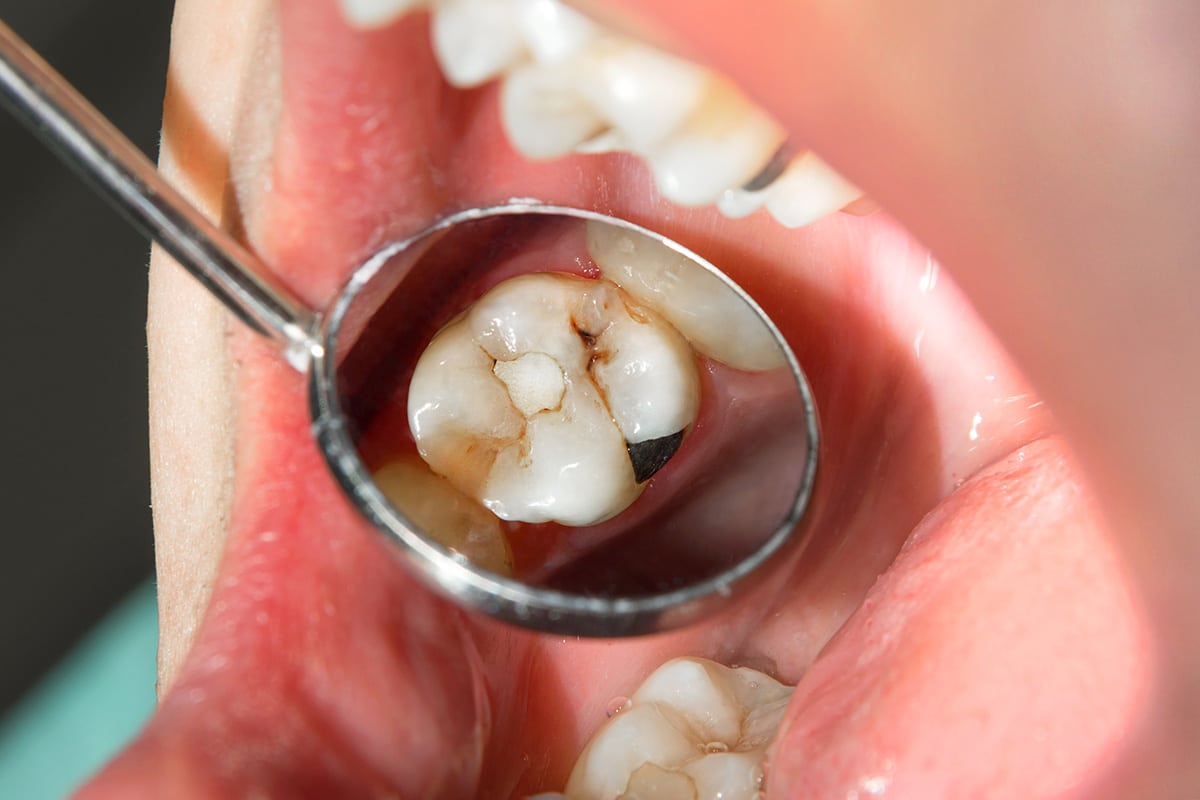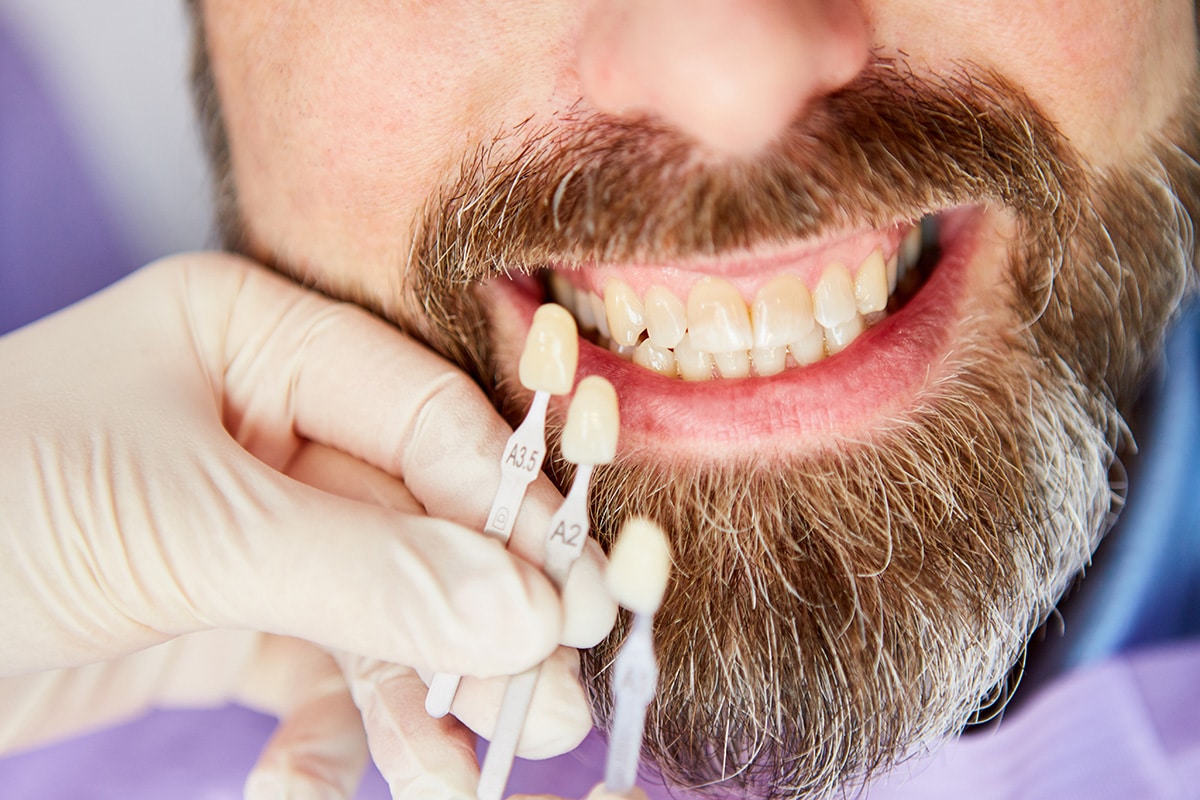Noticing your tooth is black can be alarming, but it’s a common dental issue that often signals an underlying problem.
A black tooth may indicate anything from surface stains to serious conditions like tooth decay or pulp necrosis. Understanding the root cause is key to getting the appropriate treatment and preventing further damage.
Here are just some of the causes of black teeth, the available treatments, and how to prevent tooth discolouration to protect your dental health.
What does a black tooth mean?
A black tooth is not just a cosmetic concern. It can indicate dental decay, dead tissue, or a dental restoration that has aged. Sometimes, it’s caused by external stains from certain foods, drinks, or tobacco products. The black appearance may show up as black spots, lines, or a tooth turning black entirely. Identifying whether the discolouration is on the surface or deeper within the tooth structure is crucial to determining the appropriate treatment.
When should you worry?
If your tooth is black, it’s important to see a dentist as soon as possible. While minor staining can be harmless, a tooth turning black may suggest the nerve dies inside the tooth, or an infection has developed. Left untreated, this can lead to extreme pain, gum disease, and affect your other teeth. If you’re experiencing heightened sensitivity, discomfort, or other symptoms like swelling or a bad taste, book an emergency appointment immediately.
Common causes of a black tooth
Tooth decay and cavities
Tooth decay is one of the leading causes of a black tooth. Dental decay starts when harmful bacteria feed on sugars and produce acids that wear away tooth enamel. Over time, this leads to cavities that can become dark in colour as the decay progresses. Poor oral hygiene and dry mouth are common contributing factors. Early stages of decay may appear as white or brown spots before turning black.
Rotten teeth, if ignored, can worsen to the point where the internal structure of the tooth is compromised. Regular dental check-ups and good oral hygiene are essential to catch dental issues early and prevent black teeth from developing.
Pulp necrosis (dead tooth)
When the inner pulp of the tooth dies, usually from trauma or untreated decay, the tooth can turn black. This condition, known as pulp necrosis, results in a dead tooth that may no longer be sensitive to temperature or touch. However, infection often follows, and without treatment, the surrounding bone and gum tissue can also be affected. A root canal treatment is often needed to remove the dead tissue and restore the tooth’s function and appearance.
Other possible reasons
Staining from food, drink or smoking
Certain foods and drinks like coffee, tea, and red wine can stain tooth enamel over time. Smoking and using tobacco products are also major culprits in causing black stains. These types of stains usually affect the surface of the tooth and appear as black lines or spots near the gum line. Fortunately, professional cleaning and teeth whitening treatments can often remove these stains effectively.
To prevent stains, it’s a good idea to brush regularly with fluoride toothpaste, rinse your mouth after consuming stain-causing items, and maintain good oral hygiene habits.
Dental restorations and fillings
Old or deteriorating dental fillings, especially metal-based ones, can discolour and give the tooth a black appearance. A dental restoration, like a silver amalgam filling, may darken the surrounding tooth structure over time. Additionally, poorly fitted dental work can lead to a build-up of bacteria, contributing to further decay and staining.
In some cases, replacing the old restoration with modern materials such as composite dental fillings or dental bonding can significantly improve the tooth’s appearance and health.
Diagnosis and what to expect at the dentist
What your dentist will look for
When you see a dentist about a black tooth, they will perform a thorough examination to assess the tooth and surrounding gum line. The dentist will check for signs of tooth decay, broken fillings, staining, and signs of pulp necrosis. They’ll also ask about your oral hygiene routine, recent dental work, and whether you’ve had any trauma to the tooth.
The dentist will also assess other symptoms like sensitivity, swelling, or discomfort, which can help identify whether the problem is superficial or more serious.
Tests and imaging
To get a clear view of the underlying cause, your dental professional may take X-rays to look for hidden cavities, bone loss, or infections inside the tooth. This diagnostic step helps in choosing the most effective treatment option, whether it be a filling, root canal, or another intervention. Early detection is key to preserving dental health and avoiding more invasive procedures.
Treatment options
When a filling is enough
If the black spot is due to minor tooth decay or a small cavity, your dentist may remove the decayed portion and place a dental filling. Modern materials like tooth-coloured composite fillings not only restore function but also blend in with your natural teeth. In some cases, dental bonding can be used to fix minor defects and improve appearance.
Regular dental check-ups ensure that small problems are treated early before they require more extensive procedures.
Root canal, crown or extraction?
For more severe cases, especially those involving a dead tooth or extensive decay, a root canal treatment may be necessary. This involves removing the infected pulp, cleaning the root canals, and sealing the tooth. After a root canal, the tooth often requires a dental crown to restore its strength and appearance.
If the tooth is too damaged to be saved, an extraction may be the only option. Your dentist will discuss tooth replacement options such as dentures, implants or bridges to restore function and prevent shifting of other teeth.
Prevention and long-term care
Daily habits for healthy teeth
Maintaining oral health requires consistency. Brush twice daily with fluoride toothpaste, floss regularly, and limit sugary snacks that feed harmful bacteria. Stay hydrated to combat dry mouth and rinse your mouth after consuming stain-causing drinks. These habits not only prevent tooth decay but also help prevent black teeth and other dental issues.
Avoid biting hard foods that can damage enamel and always use a mouthguard during sports to prevent trauma.
When to see your dentist
Good oral hygiene alone isn’t enough. Regular dental check-ups, ideally every six months, are vital for early detection and prevention of dental problems. If you notice a tooth is black, have heightened sensitivity, or any other unusual symptoms, book an appointment with your dentist as soon as possible.
In urgent cases like pain, swelling, or sudden darkening of a tooth, an emergency dentist can provide immediate relief and appropriate treatment. Addressing dental issues promptly helps prevent further complications and protects your overall oral health.
Come to Fulham Road Dental for expert oral care
At Fulham Road Dental, we understand how worrying it can be to notice a black tooth or any sudden change in your dental health. Our experienced team of dentists uses the latest diagnostic tools and treatments to identify the underlying cause and offer the most appropriate care, whether that’s a simple filling, a root canal, or a full dental restoration. We’re committed to providing gentle, effective solutions tailored to your individual needs.
We focus on prevention, early detection, and high-quality treatment to help you maintain a healthy, confident smile for life. If you’re concerned about a tooth turning black or any other dental issue, book a consultation with us today. We’re here to help you protect your teeth, prevent decay, and keep your oral health in top condition.




